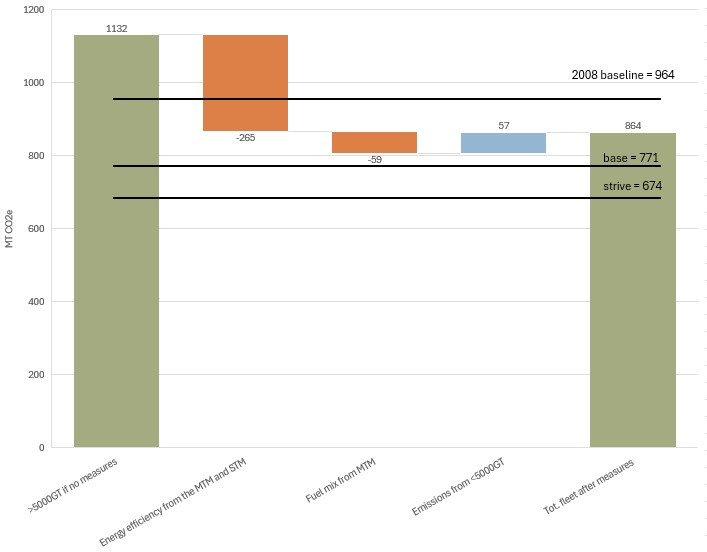
Fossil fuels set to be the minority of energy used in international shipping by 2040
LONDON : The IMO’s Marine Environment Protection Committee 83rd meeting has concluded with a weak agreement on mid-term measures that does not reduce the sector’s emissions in line with targets in the IMO’s revised GHG strategy. The agreement, constitutes a fuel standard (a mandate on the GHG intensity of energy used), coupled with a pricing and trading mechanism.
Taken in combination with the revision of IMO’s short-term measures (carbon intensity indicators), which have been extended with new increases in stringency to 2030, the new policy is only expected to achieve approximately 10% absolute GHG emission reductions relative to 2008 GHG emissions. This is significantly lower than the ‘at least 20%’, ‘striving for 30%’ that the IMO committed to in the Revised GHG Strategy in 2023.
Dr Marie Fricaudet, Senior Research Fellow at the UCL Energy Institute, said: “This adoption is a first step in the right direction, with now a part – although small – of shipping emissions being subject to what is effectively a global levy. However, with an expected fall in emissions of around 10% by 2030 compared to 2008, the level of ambition is largely insufficient to meet the IMO target of emission reduction, let alone to meet a 1.5OC trajectory.”
The levels of revenues expected from the current policy specifications of approximately $11-12bn p.a. are insufficient relative to the scale required to both support early adoption of zero near zero (ZNZ) fuels (expected needed through to 2035), and to fund just and equitable transition (JET), accounting for the needs of developing countries. Consequently, this revenue shortfall may create a competitive tension between these two objectives, thus, increasing the likelihood that neither objectives can be achieved at a level sufficient for climate and equitability.
Dr Annika Frosch, Research Fellow at the UCL Energy Institute, said: “The IMO Net-Zero Framework represents a historic turning point for international shipping. However, its success hinges on the transition being genuinely just and equitable, ensuring that climate action includes and uplifts the world’s most vulnerable populations.”
Today’s outcome is unlikely to independently drive the immediate and robust investment needed to drive long-run fuel solutions the sector urgently needs, if the solutions are to be globally available at the large volume required in the 2040’s. For the sector, and therefore global trade to avoid high and or volatile future energy costs, other sources of finance and support will be needed during the 2030’s.
Countries with poor access to capital, high cost of capital or low state intervention or support will be late to invest in the solutions needed. A major risk now occurs that the future of shipping will, like renewable energy and battery electric vehicles, be significantly owned and driven by nations with strong industrial policy. Dr Tristan Smith, Professor of Energy and Transport at the UCL Energy Institute said: “This transition is ultimately going to move fast even if it starts slowly. This means that the classic shipping business model of buying/selling on the cycle, which depends upon a technologyrisk-free residual value, will not work. The fact this policy sends at least that signal clearly, can be expected to avoid some of the greatest risks of technology lock-in e.g. to further expand LNG use. And it can be expected to now focus minds on how best to make the move to hydrogen-derived fuels. Whilst the clarity and equitability and inclusivity are not as high as they should be, this is undoubtedly a pivot moment for the sector and its GHG emissions”
Reaching agreement on a policy as contentious and groundbreaking as this, in the multilateral system, and in the current geopolitical context, is a major achievement. However, in order to achieve the agreement on the amendment, much of the key detail has been passed for development in ‘guidelines’. Guidelines are supporting documents that are adopted by resolution, likely over the next 2 years, prior to entry into force, expected in 2028. The full detail of risks and opportunities relating to all of the above points, will only become clearer once they are adopted. Further analysis of the implications of the outcome on investments risks and opportunities will be critically important.

Link to full readout: https://www.shippingandoceans.com/post/phase-out-of-fossil-fuels-in-shipping-begins-in-earnest
About UCL Energy Institute
The UCL Energy Institute hosts a world leading research group which aims to accelerate the transition to an equitable and sustainable energy and trade system within the context of the ocean. The research group’s multi-disciplinary work on the shipping and ocean system leverages advanced data analytics, cutting-edge modelling, and rigorous research methods, providing crucial insights for decision-makers in both policy and industry. The group focuses on three core areas: analysing big data to understand drivers of historical emissions and wider environmental impacts, developing models and frameworks to explore energy and trade transition to a zero emissions future, and conducting social science research to examine the policy and commercial structures that enable the decarbonisation of the shipping sector. For more information visit www.shippingandoceans.com

